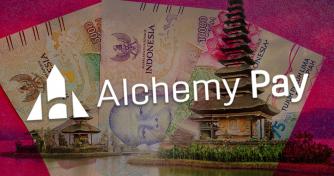 Quantum Temple enters NFT partnership with Indonesian Ministry of Tourism
Quantum Temple enters NFT partnership with Indonesian Ministry of Tourism Quantum Temple enters NFT partnership with Indonesian Ministry of Tourism
Quantum Temple founder and CEO Linda Adami told CryptoSlate she hopes to change the dynamics of cultural heritage protection through Web3.

Cover art/illustration via CryptoSlate. Image includes combined content which may include AI-generated content.
When it comes to blockchain and cultural heritage, few have greater expertise on this matter than Linda Adami, an alma mater of the Dubai Future Foundation’s innovative accelerator program, Adami is today working at the forefront of blockchain technology and sustainable tourism.
“Cultural heritage is incredibly underfunded,” she told CryptoSlate during a Mar. 1 interview. “But what if we can create immutable archives of culture using NFTs, and use them toward developing a new model for incentivizing current and future generations to stay involved in cultural heritage.”
Adami’s innovative new NFT startup aims to bridge the worlds of cultural preservation, heritage and archaeology, together with blockchain technology and sustainable tourism. The matrix or business model may not seem obvious, but it involves working with hyper-local community stakeholders and groups interested in the preservation of niche monuments, relics or sites that may be in need of upkeep.
Called the Quantum Temple, the initiative has so far raised $2 million in pre-seed funding, money which it aims to use to support blockchain developments in regions like Bali, where Adami is based.
Last week, Quantum announced a partnership with the Indonesian Ministry of Tourism, which will see them produce a series of NFTs together in collaboration with local film makers and cultural anthropologists, artists and curators.
Quantum Temple Business model
- 40% of the proceeds of every NFT sold will go towards preservation of monuments and heritage sites on Bali that are under threat.
- 40% goes to Quantum (including 5% that goes toward the Impact Fund)
- 10% going towards the artists and/or curators working on the individual NFT.
Bali’s Web3 Pivot
A key point for Adami is a UN World Tourism report, which states that out of every 100 dollars spent by tourists in a developed country, only about five dollars circulate within the economy of a developing country. In destinations like Bali, where multinational corporations operate much of the tourism infrastructure, the funds that enter the region are extracted nearly as rapidly as they arrive.
In leveraging the values of Web3, Adami hopes Quantum will be able to bridge the disparate worlds of crypto and material preservation of ancient and historical culture.
The partnership was commemorated by a celebration of Indonesian culture at Pura Tirta Empul last Friday, Feb. 24.
Under the agreement, Quantum Temple will offer a platform for local cultural artists, musicians, and creatives in Indonesia to showcase their works worldwide using NFT technology.
The company also unveiled the Paths to Alangö NFT Collection, featuring audio and visual logs that capture traditional dances, artifacts, and rituals.
During the event, Muhammad Neil El Himam, Deputy of Indonesia’s Ministry of Tourism and Creative Economy, expressed his optimism about promoting and supporting the growth of Indonesia’s creative industry and establishing the country as a center for NFT-based art and technology.
“We are working hard to achieve our goal of growth and cultural expansion,” said Himam. “We are using modern blockchain solutions to preserve historic items and experiences and share our culture with the world. We hope to attract more people to participate in our digital and physical economy.”
“Quantum Temple is a tangible project that is actually doing real social impact transparently on chain,” Adami said of her decision to work hand-in-hand with local stakeholders from community groups to government agencies responsible for tourism.
“What we are building is end-to-end web infrastructure to empower the preservation of cultural heritage,” Adami said.








































